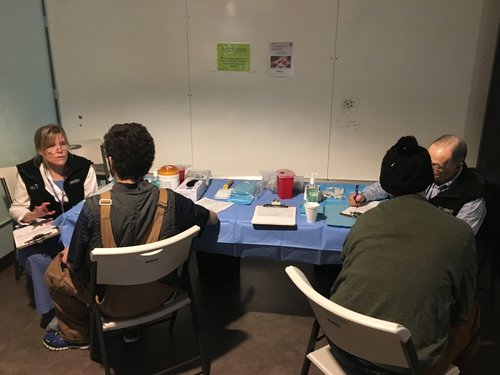Frontline Blog
Investing early to prevent hepatitis A outbreaks among people living homeless
July 2019

By Patty Hayes, RN, MN Director, Public Health – Seattle & King County
In recent years, urban areas in the US have been grappling with hepatitis A outbreaks affecting people experiencing homelessness. In 2017 in San Diego County, nearly 600 people were infected with hepatitis A, over 400 were hospitalized, and 20 people died as the result of an outbreak centered among people living without permanent shelter. The costs were astounding: San Diego County ultimately spent over $12 million responding to the outbreak, and the emotional toll on people living homeless and those who love and support them was impossible to quantify.
According to the 2019 Point in Time Count, there are over 11,000 people living homeless in King County. Given this large vulnerable population, when Public Health – Seattle & King County identified our first case of hepatitis A in someone living homeless in April 2019, we deployed both a public health response and a preventative strategy. Based on the risk of a large outbreak, I am pleased to announce King County has allocated $375,000 to expand our provision of free hepatitis A vaccinations to people living homeless. This new funding will allow us to intensify and expand hepatitis A vaccination efforts to help reduce the risk for large scale outbreaks.

The source of this funding is King County’s Loss Control Program. Within the Office of Risk Management Services, the Loss Control Program works with King County agencies to identify areas of potential loss and recommend strategies to reduce exposure to liability. It is dedicated to addressing unanticipated risks where advanced planning and budgeting is not possible.
Our County leadership understands the importance of investing early. In announcing this funding, King County Executive Dow Constantine said: “Providing hepatitis A vaccinations for people experiencing homelessness is an issue of equity, a prudent financial move, and a public health imperative. It’s our duty to protect the most vulnerable among us, and by investing in prevention we may avoid spending millions responding to the major outbreaks we’ve seen in other areas.”
Over the next few months, we will expand our free hepatitis A vaccination clinics for people experiencing homelessness throughout King County. Our goal is to deliver vaccinations to hundreds more people at high risk for infection. Vaccination teams will work in conjunction with community organizations, shelter operators and low-income housing providers as well as utilizing our Healthcare for the Homeless Network’s Mobile Medical Van to offer vaccines to people living in encampments, villages, and on the street.
Vaccination efforts for people without permanent shelter can be time-intensive. Multiple visits to shelters and encampments are required as staff build trust and provide preventive vaccinations to this highly-mobile population. I am grateful that in King County we are dedicating the resources to successfully implement this vital work.
Follow along with the work of Public Health – Seattle & King County on their Public Health Insider blog.